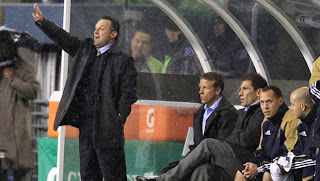
Steve Davis of MLSnet.com analyses the tactics used by each of the three new coaches in Week 1.
So now we know. We had hunches and suspicions about how three particular debuting managers would align their sides prior to MLS opening weekend—but you never really know until you know. You know?
New York’s Hans Backe and Chicago’s Carlos de los Cobos were new managers to MLS. We’ve seen Peter Nowak’s handiwork before at D.C. United, but now he pulls strings at expansion Philly, which is clearly a whole new jar of Cheez Whiz. (Nowak, in particular, approached his selections of personnel and tactics with a “State Secret” level of caution.)
In preseason, Backe had shown himself to be a 4-4-2 guy, and sure enough, Sinisa Ubiparipovic and Joel Lindpere were central in a “straight line” four-man midfield.
Across the field, de los Cobos opted for a diamond midfield. Logan Pause screened the defense while Peter Lowry, and later, Baggio Husidic, worked closer to the strikers. So much for innovation.
Nowak also went with a 4-4-2. Here, it wasn’t the alignment but the choice of personnel within that alignment that drew attention—and reminded everyone that it’s more about players than tactical deployment.
Philly started Michael Orozco and Danny Mwanga in the middle. Orozco is a defender, inserted awkwardly and surprisingly into a central midfield role. Mwanga is a forward, inserted awkwardly and surprisingly into the same. All of Mwanga’s scorer’s instincts, all that size, skill and athleticism seemed wasted on a player clearly not comfortable with the 360-degree bustle encircling him in his first pro game.
Regardless, Philadelphia’s shape and personnel were never going to matter so long as Seattle’s Osvaldo Alonso was lurking. The Sounders’ little fireball of a defensive midfield destroyer was all over the place, back to his early 20009 best. So Mwanga and Orozco, stationed centrally opposite Alonso and Brad Evans, were at a loss from the word “go.”


















